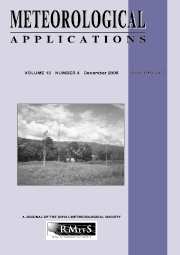Article contents
Lessons from the unusual impacts of an abnormal winter in the USA
Published online by Cambridge University Press: 07 October 2005
Abstract
Economic impacts from the near record warm and snow-free winter of 2001–2 in the United States were assessed to ascertain their dimensions and relevance to issues like climate prediction and climate change. Unusual impacts resulted and embraced numerous sectors (heating/energy use, construction, tourism, insurance, government, and retail sales). Many outcomes were gains/benefits totalling $19.6 billion, with losses of $8.2 billion. Some economists identified the sizable positive impacts as a factor in the nation's recovery from an on-going recession stemming from the terrorist attacks on 11 September 2001. Understanding the impacts of such a winter reveals how climate predictions of such conditions could have great utility in minimising the losses and maximising the gains. The results also have relevance to the global warming issue since most climate models project future average winter temperature and snowfall conditions in the United States to be similar to those experienced in 2001–2.
- Type
- Research Article
- Information
- Copyright
- 2005 Royal Meteorological Society
- 2
- Cited by




